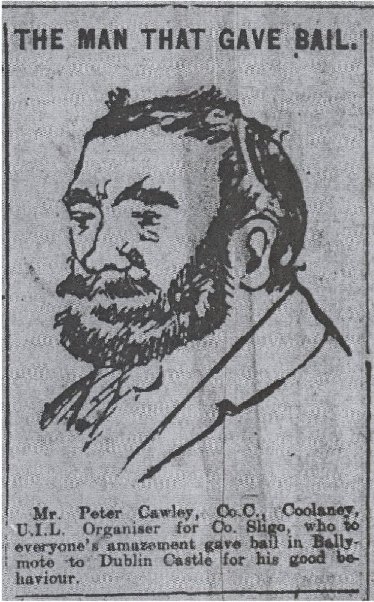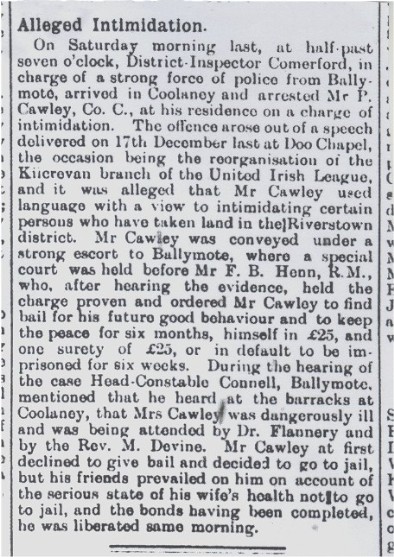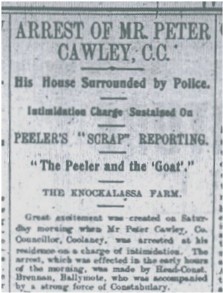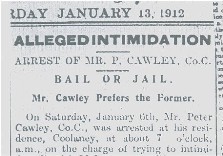Peter's Psalm - Sligo Poets
Main menu:
- Home
-
1912
- 1912
- Sligo Poetry 1912
-
1913
- 1913
- Sligo Poetry 1913
-
1914
- 1914
- Sligo Poetry 1914
-
1915
- 1915
-
Sligo Poetry 1915
- Sligo Newspaper Poems
- Sligo Champion
- Sligo Independent
- Sligo Nationalist
-
1916
- 1916
-
Sligo Poetry 1916
- Sligo Newspaper Poems 1916
- Sligo Champion
- Sligo Nationalist
- Sligo Independent
- The Poets
- Bibliography
- The Author
Sligo Times 13 January 1912
PETER'S PSALM OF PATRIOTISM.
Air—“The Lays of South Sligo.”
Tell me not in back stair numbers
Jail is but the enemy’s dreams,
For the “plank” is cold for slumbers,
And “skilly” is only what it seems.
Patriotism is zeal, Patriotism is earnest,
And the jail is not its goal;
“Sledge hammer” thou art, to “sledge hammer” returnest,
Was not written on my soul.
All enjoyment and no sorrow
Is my destined end and way;
Just I act that each tomorrow
Finds me richer than to-
“A month” is hard, and bullocks are fleeting,
And we, organisers, though stout and brave,
Still, like kettle drums are beating
Pleasant marches for the slave.
In Kilcrevan’s broad field of battle,
In the victory within our reach,
Be not like dumb driven cattle—
Be a hurler on the ditch.
Trust no Removable! however pleasant;
Let Mr. Fenton bury his dead.
Act! Act! in the open air at present
Bailsmen within and Hawkesby over-
Lives of most men just remind us
That we should, if we are wise,
Leave our blackthorns behind us,
And begin to vandalise.
PIG RING
The event which led to the publication of this poem is summarised in the report below right. Peter Cawley of Coolaney was a prominent nationalist county councillor who had a long history of political and agrarian activity. It was common for branches of the United Irish League to boycott individuals who purchased large farms to demand that the farm be divided among local small farmers. This was one such case. Peter Cawley in the 1911 Census.
The Sligo Times mocked Cawley's acceptance of bail as something which an Irish nationalist would not have normally done. That newspaper had a particular dislike for Cawley because they blamed him, an influental councillor, for their exculsion from lucrative Council advertising and printing contracts. The Roscommon Herald, a nationalist but anti-
Lays of South Sligo was a book of poetry written by prominent nationalist, John O'Dowd, who at this time was MP for South Sligo. Cawley was one of his prominent lieutenants.
The sledge-
The Removable is the Resident Magistrate. They were often mockingly referred to as Removable Magistrates because they were appointed and could be removed by Dublin Castle at any time.
Fenton is prominent unionist, William Russell Fenton (1852-
Hawksby refers to Jackson Hawksby, clerk of the Petty Sessions court in Ballymote. In 1911 Census.
There are no clues as to the author of this poem.


Above left: A drawing of Peter Cawley from the Roscommon Herald, 13 January 1912.
Above right: The report which appeared in the Sligo Independent of the same date.
Below left: The Sligo Champion's headlines stressed the action of the police and the magistrates. Below right: The Sligo Times headlines emphasising Cawley's choice of bail rather than jail.

